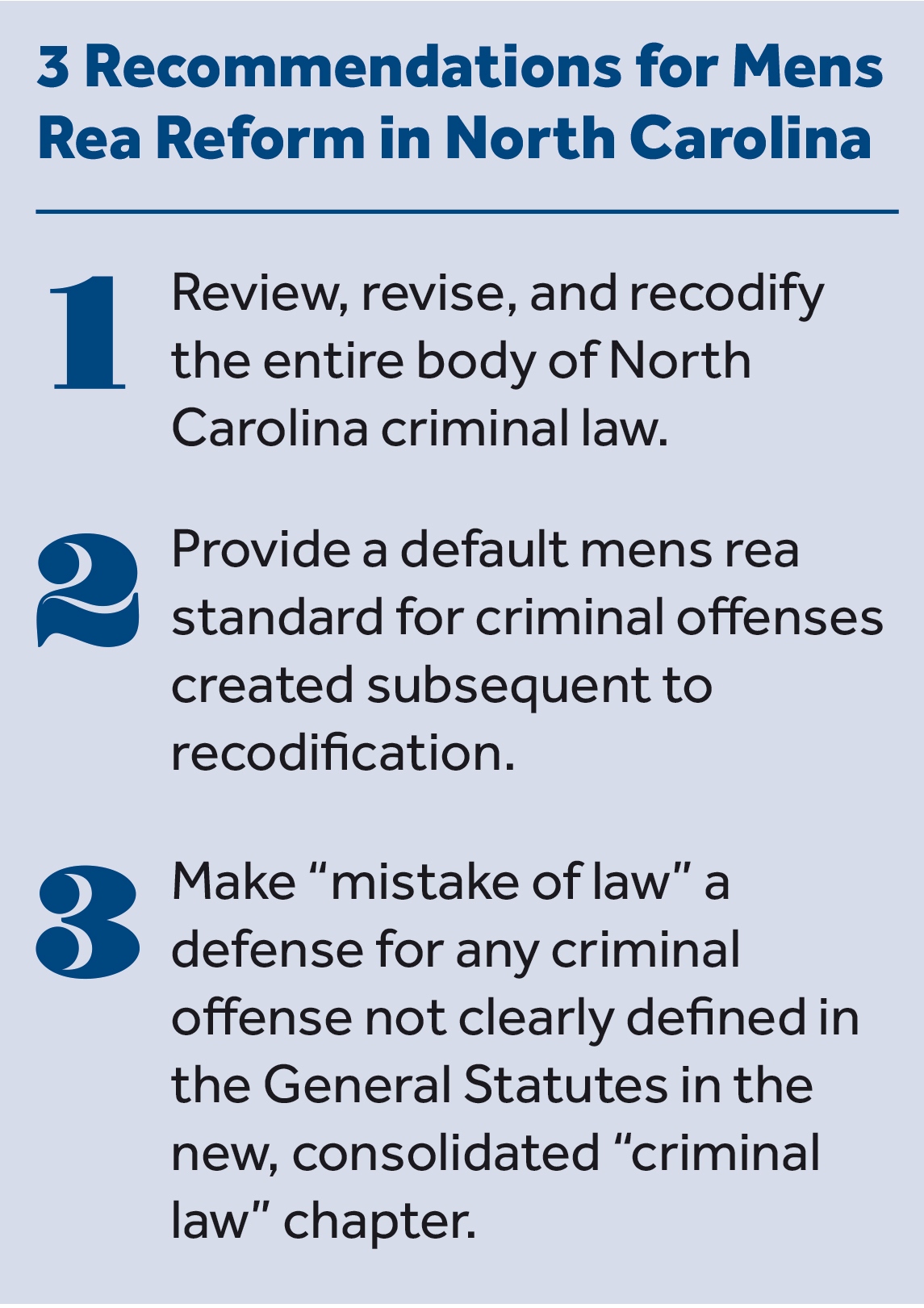
For centuries, it was a universally accepted principle of Anglo-American law that a criminal conviction requires proof, not only of a wrongful act—which lawyers call the “actus reus”—but also of a culpable state of mind—which they call the “mens rea.”1 The principle was incorporated into our legal system at a time when legal proceedings were still conducted in Latin, hence the strange terminology, but no Latin is required to understand the principle itself. In his Commentaries on the Laws of England, which was highly influential first in the American colonies and later in the newly formed American republic,
William Blackstone summed it up in English:
An unwarrantable act without a vicious will is no crime at all. So that to constitute a crime against human laws, there must be, first, a vicious will; and, secondly, an unlawful act consequent upon such vicious will. 2
By the time the first American edition of Blackstone’s Commentaries was published in 1771, the mens rea requirement had been protecting innocent people from unjust prosecution for more than 600 years. Less than a century later, however, American courts had already begun to make an exception for a new class of “public welfare” crimes, i.e., crimes that punished people, not for doing something that was inherently wrong or that harmed some identifiable victim, but simply for violating one or another of a growing list of regulations that were supposed to improve the social condition.
Both the number of these “strict liability” offenses, and the range of previously lawful conduct to which they apply, have been growing rapidly ever since.3 As a result, in North Carolina and throughout the country, innocent people are now continually at risk of being charged, prosecuted, and convicted for conduct they do not know, and cannot reasonably be expected to know, is illegal. This Spotlight looks at how we arrived at this unfortunate state of affairs and at what can be done to improve matters.
The Rise of the Regulatory State and Transformation of the Criminal Law
The mens rea requirement protects the innocent by distinguishing between a mistake or accident (for which restitution may be required) and an actual crime (that is deserving of punishment and opprobrium). To illustrate, if, at the end of a visit, I take home my neighbor’s umbrella in the mistaken belief that it belongs to me, I may be legally obliged to return it, but I have not committed a crime. If, on the other hand, I take the umbrella knowing it is not mine and with the intention of keeping it, I have committed the crime of larceny. That knowledge and that intention are the mens rea elements of larceny, and both must be proved before I can be convicted.
The distinction between innocent mistakes and crimes used to be considered very important. Indeed, the mens rea requirement seems to have been introduced into our legal system in the 12th century for the precise purpose of distinguishing between torts (accidental harms) and crimes, and it served that purpose effectively for more than seven centuries.4 Ironically, it finally began to fall out of favor at a time when the criminal law was changing in ways that made the protection it afforded more necessary than ever.
At the end of the 19th century, to facilitate the emergence of the modern regulatory state, the criminal law was transformed from a system for punishing wrongdoers into an instrument for social control. As the regulatory state expanded, and as its social engineering goals became more ambitious, the number and range of crimes grew rapidly. There was no obvious reason why the mens rea requirement should not have continued to apply to this growing list of crimes. Indeed, if anything, the fact that so much previously lawful conduct was being criminalized would seem to suggest the opposite.
Nevertheless, Progressive Era reformers believed that the law, among other institutions, could be used as an active agent of social, economic, and political change. They saw the mens rea requirements as an impediment to the realization of their plans, and they persuaded like-minded legislators and judges to dispense with it, at least as far as the rapidly expanding class of regulatory crimes was concerned.5
Impact of Changes in North Carolina
In North Carolina, we are living with the consequences of these changes. Chapter 14 of the North Carolina General Statutes, which deals specifically with “Criminal Law,” includes over 840 sections defining almost as many separate criminal offenses. However, a citizen who relied on that chapter alone for knowledge about what is and what is not a crime would be making a terrible mistake. Definitions of hundreds of additional crimes are sprinkled here and there throughout more than 140 other chapters of the General Statutes. Making matters worse, these and other chapters also include numerous “catchall” provisions that criminalize the rules and regulations that are promulgated by various administrative agencies, by professional licensing boards, by county and municipal governments, and even by metropolitan sewer districts. These criminalized rules and regulations do not appear in the General Statutes at all. Instead, a citizen who wants to learn about them must comb through hundreds of pages of the N.C. Administrative Code and other compilations.6
For many of these crimes, and for most “regulatory” crimes, the official definition does not include any mens rea requirement. That does not necessarily mean that these are all “strict liability” crimes for which conviction is possible regardless of what the suspect knew or intended. In some instances, the courts have found an implicit mens rea requirement even when the statute is silent. Nevertheless, for many crimes the courts have found that strict liability does, indeed, apply, and for many others the question has yet to be litigated, which leaves the whole matter up in the air.7
The result is patently unjust. Because there are so many of them and because they have been documented in such a haphazard fashion, it is impossible for ordinary citizens to learn about and understand all the criminal laws and criminalized regulations that govern their everyday activities. Moreover, because so many of those laws and regulations criminalize conduct that is not inherently evil and does not cause harm to any identifiable victim, ordinary citizens cannot rely on their intuitive notions of right and wrong to alert them to the fact that they may be committing a crime. With no mens rea requirement to protect them, these citizens must rely on prosecutorial discretion and judicial interpretation to avoid unjust prosecution and conviction.
It is time to reconsider the trade-off the progressives made between regulatory efficiency and justice. Even modern progressives agree that due process requires proof of mens rea for people accused of rape and murder. Why should we not be at least as solicitous of the due process rights of people accused of “sale of speleothems”8 or of “cutting timber… without disposing of boughs and debris… on lands within 400 feet of any watershed held or owned by any city or town”?9
Recommendations
 Given the weight of both state10 and federal11 precedent, it seems clear that the North Carolina legislature has, and will continue to have, the power to create strict liability crimes if it chooses to do so. Nevertheless, the citizens of North Carolina can demand that if and when the legislature decides to exercise that power, it must do so—not by delegating the power to some unelected agency or self-interested professional licensing board—but after public deliberation and an on-the-record vote by which the members can be held individually accountable. And the citizens can also demand that if and when the legislature decides to create a strict liability crime, it must provide the public with adequate notice by making strict liability an explicit part of the definition of that crime, and by publishing that definition where it can easily be found in the appropriate chapter of the statute book.
Given the weight of both state10 and federal11 precedent, it seems clear that the North Carolina legislature has, and will continue to have, the power to create strict liability crimes if it chooses to do so. Nevertheless, the citizens of North Carolina can demand that if and when the legislature decides to exercise that power, it must do so—not by delegating the power to some unelected agency or self-interested professional licensing board—but after public deliberation and an on-the-record vote by which the members can be held individually accountable. And the citizens can also demand that if and when the legislature decides to create a strict liability crime, it must provide the public with adequate notice by making strict liability an explicit part of the definition of that crime, and by publishing that definition where it can easily be found in the appropriate chapter of the statute book.
Taking the following steps would ensure that both of those demands are met.
1. Review, revise, and recodify the entire body of North Carolina criminal law.
In 2014, in a Manhattan Institute report titled “Overcriminalization in the Old North State,” James R. Copland and Isaak Gorodetski recommended “consolidating, clarifying, and optimizing North Carolina’s criminal statutes.”12 Two years later, the John Locke Foundation made a similar recommendation in a compilation of legislative suggestions titled Agenda 2016.13 If properly implemented, the consolidation, clarification, and optimization process would:14
- Eliminate all crimes that are obsolete, unnecessary, redundant, inconsistent, or unconstitutional, and, where appropriate, downgrade minor regulatory offenses from crimes to infractions;15
- Ensure that the definition of each crime is clear and complete, and that it includes an explicit statement about what level of mens rea, if any, is required for conviction; and
- Consolidate the entire body of criminal law into a single, well organized and clearly written chapter of the General Statutes.
Successful recodification along those lines would provide an immediate solution to the problems discussed in this Spotlight, including the problems associated with mens rea. To ensure that those problems do not emerge again in the future, however, the following complementary measures should be considered.
2. Provide a default mens rea standard for criminal offenses created subsequent to recodification.
The idea of a default mens rea standard is not new. The Model Penal Code, which has been adopted by many states since it was originally developed by the American Law Institute in 1961, includes the following provision:
When the culpability sufficient to establish a material element of an offense is not prescribed by law, such element i established if a person acts purposely, knowingly, or recklessly with respect thereto.16
North Carolina could adopt a similar default standard for all crimes created subsequent to recodification.17 Doing so would ensure that the North Carolina legislature never again creates a strict liability crime by accident or by stealth. Instead, legislators would be forced to go on the record whenever they wanted to create a strict-liability crime, which would discourage them from creating such crimes without careful deliberation.
3. Make “mistake of law” a defense for any criminal offense not clearly defined in the General Statutes in the new, consolidated “criminal law” chapter.
 This recommendation conflicts with a principle of law that is, if anything, even older than the mens rea requirement, i.e., “ignorance of the law is no excuse.”18 Unlike the mens rea requirement, however, the “ignorance of the law is no excuse” principle really has been rendered obsolete by the rise of the regulatory state. The principle made sense in the past because most citizens could be expected to know what was and was not a crime. The number of crimes was small and changed little from year to year, and, moreover, most of those crimes involved acts that were either inherently evil or caused direct harm to an identifiable victim. None of those conditions pertains in modern day North Carolina, however. While the recodification recommended here would go a long way toward improving matters in the short term, permitting a mistake of law defense for crimes that are not clearly defined in the appropriate chapter of the statute book would both discourage the legislature from hiding crimes away in other places in the future and protect innocent citizens if it did.
This recommendation conflicts with a principle of law that is, if anything, even older than the mens rea requirement, i.e., “ignorance of the law is no excuse.”18 Unlike the mens rea requirement, however, the “ignorance of the law is no excuse” principle really has been rendered obsolete by the rise of the regulatory state. The principle made sense in the past because most citizens could be expected to know what was and was not a crime. The number of crimes was small and changed little from year to year, and, moreover, most of those crimes involved acts that were either inherently evil or caused direct harm to an identifiable victim. None of those conditions pertains in modern day North Carolina, however. While the recodification recommended here would go a long way toward improving matters in the short term, permitting a mistake of law defense for crimes that are not clearly defined in the appropriate chapter of the statute book would both discourage the legislature from hiding crimes away in other places in the future and protect innocent citizens if it did.
Conclusion
Among the many principles of Anglo-American law that have been sacrificed on the altar of the regulatory state, the mens rea requirement is among the oldest and most fundamental.19 It is far from clear that this sacrifice was necessary or that the benefits have been worth the cost. We should do what we can to revive this important protection in North Carolina. Taking the steps described here would protect North Carolinians from unjust prosecution now and for the foreseeable future. That would not only be a great achievement, it would establish North Carolina as the clear leader in criminal justice reform and make us an example for the rest of the country to follow.
Endnotes
1. The phrases derive from the Latin maxim: Actus reus non facit reum nisi mens sit rea. (“A guilty act does not make a person guilty unless the mind is also guilty.”)
2. 4 William Blackstone, Commentaries on the Laws of England, 20-21 (1769).
3. So-called because no evidence of culpability was required.
4. Eugene J. Chesney, “Concept of Mens Rea in the Criminal Law,” 29 Am. Inst. Crim. L. & Criminology 627 (1938-1939); http://scholarlycommons.law.northwestern.edu/cgi/viewcontent.cgi?article=2828&context=jclc.
5. For an early discussion of this change, see, Francis B. Saye, Public Welfare Offenses, 33 Colum. L. Rev. 55 (1933).
6. For an excellent discussion of the out-of-control growth for North Carolina criminal law see, Jeff Welty, Overcriminalization in North Carolina, 92 N.C. L. Rev. 1935 (2014); http://scholarship.law.unc.edu/nclr/vol92/iss6/7.
7. See Jessica Smith, “Strict Liability Crimes” (UNC School of Government Criminal Law Blog, 11-30-2010): http://nccriminallaw.sog.unc.edu/strict-liability-crimes/.
8. N.C. Gen. Stat. § 14-159.22; http://www.ncleg.net/EnactedLegislation/Statutes/PDF/BySection/Chapter_14/GS_14-159.22.pdf.
9. N.C. Gen. Stat. § 14-383; http://www.ncga.state.nc.us/EnactedLegislation/Statutes/PDF/BySection/Chapter_14/GS_14-383.pdf.
10. Haskins, 160 N.C. App. at 353 (rejecting the defendant’s argument that without a mens rea element, G.S. 14-269.2 violates Equal Protection); Ainsworth, 109 N.C. App. at 145 (rejecting the defendant’s argument that the constitution requires that statutory rape include some mens rea).
11. Morissette v. United States, 342 U.S. 246 (distinguishing between traditional common law crimes, for which mens rea is required, and public welfare offenses, for which it is not); Lambert v. California, 355 U.S. 225, 228 (1957) (holding that, “There is wide latitude in the lawmakers to declare an offense and to exclude elements of knowledge and diligence from its definition”).
12. James R. Copland & Isaak Gorodetski, Overcriminalization in the Old North State (New York: Manhattan Institute, 2014), 8; https://www.manhattan-institute.org/html/overcriminalizing-old-north-state-primer-and-possible-reforms-north-carolina-5721.html.
13. Agenda: Advancing Freedom in North Carolina through Wise Public Policy Choices (Raleigh: John Locke Foundation, 2016), 52-3; http://www.johnlocke.org/research/agenda-2016/.
14. This list was adapted from: Edwin Meese III, Principles for Revising the Criminal Code: Testimony before House Judiciary Committee on Crime, Terrorism and Homeland Security (Wash. D.C.: Heritage Foundation, 2011); http://bit.ly/2lAC61R.
15. N.C. Gen. Stat. § 14-3.1(a) defines an infraction as “a noncriminal violation of law not punishable by imprisonment.” The fact that infractions are not criminal offenses in North Carolina means that the former have many fewer collateral consequences regarding eligibility for employment, housing, professional licensing, etc.
16. Model Penal Code §2.02(3).
17. The language would have to be modified to reflect the mental states that are recognized in North Carolina, which differ significantly from the MPC. See, Smith, Jessica, North Carolina Crimes: A Guidebook on the Elements of Crime, Seventh Edition (Chapel Hill: UNC School of Government, 2012), 3-10.
18. Blackstone declares that, “Ignorantia juris, quod quisque teneture scire, neminem excusat is as well the maxim of our own law as it was of the Roman.” Regardless of whether this attribution is correct, what makes his discussion interesting is the fact that he qualifies the application of the principle by saying, “For a mistake in point of law, which every person of discretion not only may, but is bound and presumed to know, is in criminal cases no sort of defence [sic].” That would seem to imply that a mistake in point of law may very well be a valid defense when, as is so often the case nowadays, a person of discretion may not know, and cannot reasonably be presumed to know, the law. (Book 4, ch.2, 27).
19. Among the other important principles that Progressives persuaded politicians and judges to abandon were the principles of federalism and the separation of powers.





